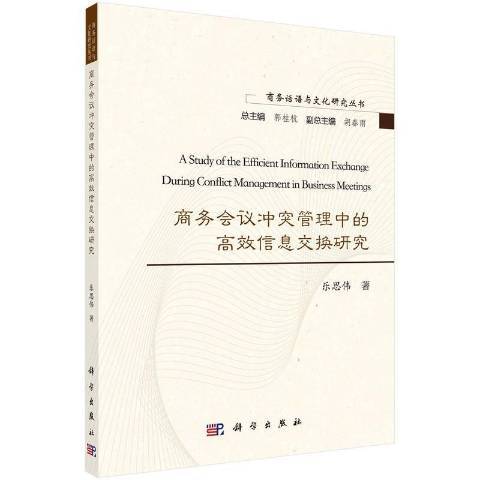《商務會議衝突管理中的信息交換研究》是2021年科學出版社出版的圖書。
基本介紹
- 中文名:商務會議衝突管理中的信息交換研究
- 作者:樂思偉
- 出版社:科學出版社
- 出版時間:2021年10月
- 開本:16 開
- ISBN:9787030696700
內容簡介,圖書目錄,
內容簡介
《商務會議衝突管理中的高效信息交換研究=A Study of the Efficient Information Exchange During Conflict Management in Business Meetings:英文》基於語篇信息理論,通過分析中美商業真人秀商務會議中的衝突語篇,識別商務會議衝突管理中常採用的“滿足對手需求”“尋求共同基礎”等八類35種策略和“歸納”“舉例”等四類27種技巧,歸納了實施各種策略和技巧時交換信息的結構特徵,並探討了三維文化語境下商務交際參與者如何通過高效信息交換實現解決衝突、激化衝突、擱置衝突三種衝突管理方式。《商務會議衝突管理中的高效信息交換研究=A Study of the Efficient Information Exchange During Conflict Management in Business Meetings:英文》據此構建了以三維文化因素為社會語境,以交際目的、交際策略、交際技巧、語篇信息結構為構件的衝突管理信息交換分析模型。該模型揭示了文化、商務交際行為與語篇信息的互動關係,為跨文化商務交際活動的語言學研究提供了新的視角和分析框架。
圖書目錄
Contents
總序
前言
List of Abbreviations
Chapter 1 Introduction 1
1.1 Conflict Management in Business Meetings 1
1.2 Cultural Contexts of Conflict Management in Business Meetings 3
1.3 Information Exchange of Conflict Management in Business Meetings 5
1.4 Summary 7
Chapter 2 The Characteristics of Cultural Contexts of Internal Business Meetings 8
2.1 Profile of Chinese and American Internal Business Meetings under Investigation 9
2.1.1 Simulated Internal Business Meetings 9
2.1.2 The Themes of Internal Business Meetings 11
2.1.3 The Conflict Discourse of Internal Business Meetings 12
2.2 Three-dimensional Cultural Context of Business Communication 14
2.2.1 National Culture 15
2.2.2 Business Culture 16
2.2.3 Personal Culture 17
2.3 Three-dimensional Cultural Context of Chinese and American Internal Business Meetings 18
2.3.1 The Impact of National Culture Context 18
2.3.2 The Impact of Business Culture Context 19
2.3.3 The Impact of Personal Culture Context 21
2.4 Summary 30
Chapter 3 Information Exchange Scheme of Business Meetings 31
3.1 Communicative Purposes 31
3.2 Communicative Strategies 38
3.3 Communicative Skills 39
3.4 Discourse Information Structure 41
3.5 The Working Scheme of Information Exchange 46
3.6 Summary 48
Chapter 4 Communicative Strategies of Conflict Management in Business Meetings and Their Informational Characteristics 50
4.1 Conflict Management Strategies of Persuading and Their Informational Characteristics 50
4.1.1 Strategies Serving the Persuading Purpose and Their Information Structure 51
4.1.2 Distributional Characteristics of Strategies Serving the Persuading Purpose 65
4.1.3 Informational Characteristics of Strategies Serving the Persuading Purpose 66
4.2 Conflict Management Strategies of Compelling and Their Informational Characteristics 68
4.2.1 Strategies Serving the Compelling Purpose and Their Information Structure 69
4.2.2 Distributional Characteristics of Strategies Serving the Compelling Purpose 79
4.2.3 Informational Characteristics of Strategies Serving the Compelling Purpose 80
4.3 Conflict Management Strategies of Avoiding and Their Informational Characteristics 82
4.3.1 Strategies Serving the Avoiding Purpose and Their Information Structure 82
4.3.2 Distributional Characteristics of Strategies Serving the Avoiding Purpose 83
4.3.3 Informational Characteristics of Strategies Serving the Avoiding Purpose 84
4.4 Conflict Management Strategies of Accommodating and Their Informational Characteristics 84
4.4.1 Strategies Serving the Accommodating Purpose and Their Information Structure 84
4.4.2 Distributional Characteristics of Strategies Serving the Accommodating Purpose 86
4.4.3 Informational Characteristics of Strategies Serving the Accommodating Purpose 87
4.5 Conflict Management Strategies of Ignoring and Their Informational Characteristics 87
4.5.1 Strategies Serving the Ignoring Purpose and Their Information Structure 87
4.5.2 Distributional Characteristics of Strategies Serving the Ignoring Purpose 90
4.5.3 Informational Characteristics of Strategies Serving the Ignoring Purpose 90
4.6 Conflict Management Strategies of Collaborating and Their Informational Characteristics 91
4.6.1 Strategies Serving the Collaborating Purpose and Their Information Structure 92
4.6.2 Distributional Characteristics of Strategies Serving the Collaborating Purpose 95
4.6.3 Informational Characteristics of Strategies Serving the Collaborating Purpose 95
4.7 Conflict Management Strategies of Bargaining and Their Informational Characteristics 96
4.7.1 Strategies Serving the Bargaining Purpose and Their Information Structure 97
4.7.2 Distributional Characteristics of Strategies Serving the Bargaining Purpose 108
4.7.3 Informational Characteristics of Strategies Serving the Bargaining Purpose 109
4.8 Conflict Management Strategies of Supporting and Their Informational Characteristics 110
4.8.1 Strategies Serving the Supporting Purpose and Their Information Structure 111
4.8.2 Distributional Characteristics of Strategies Serving the Supporting Purpose 115
4.8.3 Informational Characteristics of Strategies Serving the Supporting Purpose 116
4.9 Summary 117
Chapter 5 Communicative Skills of Conflict Management in Business Meetings and Their Informational Characteristics 121
5.1 Argumentative Skills and Information Structure 122
5.2 Tone-softening Skills and Information Structure 125
5.3 Tone-hardening Skills and Information Structure 129
5.4 Manipulative Skills and Information Structure 133
5.5 Summary 138
Chapter 6 Case Studies: Efficient Information Exchange During Conflict Management in Business Meetings 143
6.1 Case One: Resolving a Conflict 144
6.1.1 Introduction to Case One 144
6.1.2 Three-dimensional Cultural Influences on Conflict Resolution 155
6.1.3 The Tactful Employm

